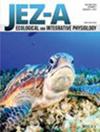Parasite infection negatively affects PHA-triggered inflammation in the subterranean rodent Ctenomys talarum.
IF 2.8
3区 生物学
Q2 Agricultural and Biological Sciences
Journal of experimental zoology. Part A, Ecological genetics and physiology
Pub Date : 2016-02-01
DOI:10.1002/jez.2003
引用次数: 9
Abstract
Magnitude and effectiveness of immune responses vary greatly between and within species. Among factors reported to determine this variation, parasitism is a critical one, although controversial effects of parasites over immunological indices have been reported. Information regarding immune strategies in species with different life histories is crucial to better understand the role of immune defenses in an ecological and evolutionary context. Here, we examine the influence of the parasite community on immune responsiveness of a solitary subterranean rodent, Ctenomys talarum. To do this, we assessed the impact of the natural parasite community and the experimental infection with Eimeria sp. on the phytohemagglutinin (PHA)-response, as well as other immune, condition, nutrition, and stress parameters. PHA-triggered inflammation was similarly impaired by Eimeria sp. infection alone or co-occurring with a number of gastrointestinal nematodes. None of the other physiological parameters studied were affected by parasitism. This indicates that parasitism is a general key factor modulating immune responsiveness of the host, and in particular for C. talarum, it could explain the great inter-individual variation previously observed in the PHA-response. Thus, our results highlight the importance of taking the parasite community into account in ecoimmunological studies, particularly when using immunological indices.在地下啮齿类动物中,寄生虫感染对pha引发的炎症有负面影响。
免疫反应的强度和效力在物种之间和物种内部差别很大。在已报道的决定这种变异的因素中,寄生是一个关键因素,尽管寄生虫对免疫指标的影响存在争议。关于不同生命史物种的免疫策略的信息对于更好地理解免疫防御在生态和进化背景下的作用至关重要。在这里,我们研究了寄生虫群落对独居地下啮齿动物Ctenomys talarum免疫反应的影响。为此,我们评估了天然寄生虫群落和艾美耳球虫实验感染对植物血凝素(PHA)反应的影响,以及其他免疫、条件、营养和应激参数。pha引发的炎症同样会因艾美耳球虫单独感染或与许多胃肠道线虫共同发生而受损。其他生理参数均不受寄生影响。这表明寄生是调节寄主免疫反应的一个普遍关键因素,特别是对于C. talarum,它可以解释之前在pha反应中观察到的巨大个体间差异。因此,我们的结果强调了在生态免疫学研究中考虑寄生虫群落的重要性,特别是在使用免疫学指标时。
本文章由计算机程序翻译,如有差异,请以英文原文为准。
求助全文
约1分钟内获得全文
求助全文
来源期刊
CiteScore
1.29
自引率
3.60%
发文量
0
审稿时长
6-12 weeks
期刊介绍:
The Journal Journal of Experimental Zoology Part A: Ecological Genetics and Physiology publishes articles at the three-way interface between Physiology, Ecology and Evolutionary Genetics. Contributions that help to elucidate how molecular, functional and ecological variation relate to one another are particularly welcome. The Journal publishes original research in the form of rapid communications or regular research articles, as well as perspectives and reviews on topics pertaining to the scope of the Journal. Acceptable articles are not limited to studies on animals, but also include research on plants and microbes.

 求助内容:
求助内容: 应助结果提醒方式:
应助结果提醒方式:


